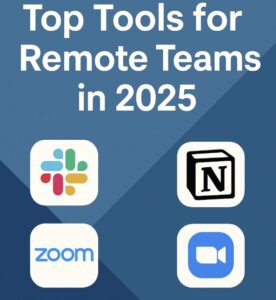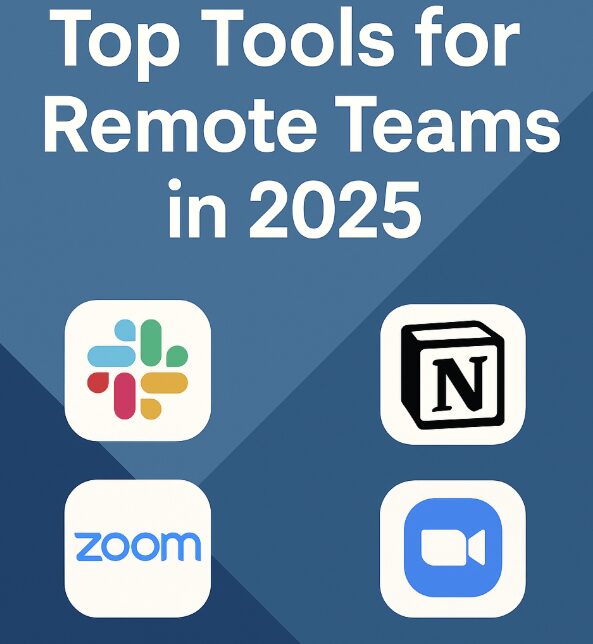Remote work is no longer an exception; it’s the default for millions of professionals around the world. Whether you’re leading a startup or part of a global enterprise, the right tools can make or break your team’s productivity and communication.
In 2025, remote work tech has evolved to be more flexible, intuitive, and integrated than ever before. Here’s a comprehensive guide to the top tools your team should be using—and how to get the most out of each one.

Slack: Real-Time Communication That Keeps Everyone in Sync
Slack continues to dominate the remote communication space by offering an organized and instant way to stay in touch. Channels let you separate topics by project, department, or client, while direct messages and huddles (lightweight voice calls) keep casual conversations going.
Why teams love Slack:
Intuitive interface for fast adoption
Integrates with Notion, Google Drive, Zoom, GitHub, and more
Allows asynchronous updates across time zones
Threaded conversations reduce message overload
You can explore Slack for free or upgrade for advanced search, compliance, and team management. Try it here: slack.com
Notion: Your Team’s Connected Workspace
Notion is an all-in-one workspace where teams can write documents, manage tasks, store knowledge, and collaborate in real time. As of 2025, it’s become even more powerful with improved database filtering, AI summaries, and team dashboards.
Best use cases:
Project wikis
Meeting notes synced with calendars
Task management linked to sprints
Onboarding documentation
Notion’s flexibility is its greatest strength. It replaces multiple tools (like Confluence, Trello, and Evernote) with one unified experience. Sign up at notion.so
Zoom: Reliable Video Conferencing for Teams of Any Size
Zoom remains the go-to platform for video meetings, thanks to its stability, scalability, and constant innovation. In 2025, features like AI-powered background cleanup, smart meeting summaries, and built-in whiteboards make Zoom even more useful.
Zoom’s latest updates:
Smart meeting summaries and recordings
Breakout rooms with better host controls
Whiteboard tools for brainstorming sessions
End-to-end encryption and improved latency
Many teams now use Zoom in combination with Slack and Notion to cover the full communication spectrum. Check out Zoom at zoom.us
ClickUp: Manage Projects and Tasks Without the Chaos
ClickUp has rapidly grown as one of the top project management tools. It offers a rich suite of features from task tracking to goal setting, time tracking, and workload balancing.
Why it’s better than traditional tools:
Customizable dashboards
Built-in docs and sprints
Time estimates and workload views
Easy import from Asana, Trello, or Monday.com
ClickUp is great for teams that want flexibility with structure. It can adapt to any workflow style. Try it out at clickup.com
Loom: Share Your Screen, Save Your Time
Loom lets you record quick videos to explain tasks, give feedback, or walk through ideas without needing to schedule a meeting. In a remote environment, asynchronous video can bridge the gap between written text and real-time calls.
When to use Loom:
Team onboarding and training
Design walkthroughs or product demos
Customer support tutorials
Performance reviews
Loom’s chrome extension makes it easy to record instantly, and videos can be shared with a simple link. Explore Loom here: loom.com
Figma: Collaborative Design in the Cloud
Figma is the leading cloud-based UI/UX design tool. It allows designers, developers, marketers, and product managers to collaborate on prototypes in real time.
Why remote teams love Figma:
Simultaneous editing with live comments
Component libraries and design systems
Easy handoff to developers with code export
Integrates well with Notion and Jira
As product design becomes more cross-functional, Figma’s ability to unite teams on one canvas is invaluable. Try it at figma.com
Miro: Brainstorm, Plan, and Map Ideas Visually
Miro is a virtual whiteboard tool that helps remote teams brainstorm, plan, and visualize concepts together. It’s especially useful for strategy workshops, product roadmaps, and sprint planning.
Key features:
Infinite canvas with sticky notes and templates
Voting and timer tools for facilitation
Collaboration without login for guest access
Integration with Slack, Notion, and Jira
You can start for free and upgrade as your team grows. Visit miro.com
Bonus: Tools Worth Exploring in 2025
Krisp: Removes background noise in calls
Toggl Track: Lightweight time tracking
Scribe: Auto-generates process documentation from your screen activity
Twist: Async communication for deep work-focused teams
These tools may not be essential for everyone, but they can dramatically improve efficiency depending on your team’s needs.
Picking the Right Tools for Your Remote Team
Not every tool on this list will be right for every team. The best setup depends on your company size, work culture, and preferred communication style.
Here’s a simple framework:
Startups: Use Slack, Notion, Loom, and ClickUp for a lean stack
Agencies: Try Slack, Zoom, Miro, and Figma for client collaboration
Product teams: Combine Slack, Figma, Notion, Zoom, and ClickUp
Test different platforms with your team. Most tools offer free tiers or trials, so you can explore before committing. And don’t forget to regularly audit your stack—if a tool isn’t getting used, replace it.
To begin building your ideal remote workflow, check out platforms like Slack, Notion, and Zoom to get started today.
